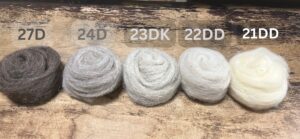02/14/2024
Demystifying Domestic Carded Sliver
Visitors to our warehouse often peak behind the massive dragon yurt that separates the “show room” from the storage and wonder where the equipment is. They quickly learn that there isn’t any, just bales of top, fadges of scoured wool, piles and piles of bags of carded sliver, a rickety old scale, a bale frame, wire cutters, and our trusty electric pallet jack.
We don’t make anything (save for a few skeins of yarn that Grace slowly produces in stolen moments behind the wheel). We also don’t own sheep. We are merchants. We buy and we sell. We use our connections to provide access to industrial-quality products at wholesale prices to the handcraft market (or anybody, really). One of our goals is to curate a wide selection of wool and fiber products for anyone who might have a use for them.
That said, our Domestic Carded Sliver line is full of products we have “shepherded” from the grease to the hands of our talented customers. We buy raw fleece, whether by the truckload from an established warehouse network or wool pool, by the bale from a local wool grower, or by the pound from the hobby farmer who brings their fleeces in individual trash bags. When we accumulate enough like-wool for a commercial scouring, we send it down to South Carolina where it is washed at one of two large-scale scouring facilities currently operating in the US.
Once the wool is scoured, there’s two paths it might take. We might sell it! By the bale (anyone with a need for several hundred pounds of wool is welcome to inquire) or by the pound through our website. But the majority of our scoured wool makes it’s way up the coast to Pennsylvania where we have it processed to become our Domestic Carded Sliver.
If you’ve spent time studying our Carded Sliver line, you might notice a strange numbering convention. Uncle John Lindsay, who ran our Philadelphia warehouse for decades, joked that he never tried to hard to figure out the numbering convention since it came from Phil’s imagination. While there are some oddities, there is a pattern to the numbers that we hope can help folks figure out the best item for them.

Around the warehouse we also call our Domestic Carded Sliver our “20 series” and the higher the number in the 20s, the darker the wool. So the product numbers with 21s are white (or that creamy yellow/white, depending on the product) and 28 is black. Everything else falls somewhere in between. The 20-series evolved from our original carded sliver supplier Mike Hastie from New Zealand, who was a big inspiration to us for getting into the crafts industry too. Phil worked with him at W. Tucker Ltd Wool Scours in Hawkes Bay, New Zealand way back when.
Something unique about the 20-series line is we can mix in some dark wool with bales of a specific breed, creating really lovely offwhite and light grey versions of products. For example, our #22DD Offwhite Cheviot has 10% dark wool mixed in, so it retains the wonderful loft associated with the Cheviot breed, but at a lovely light grey color.
And then there’s the alphabet soup that comes after the 20 number. Yes these do mean something! Here’s a list of what we’re currently working with as of February 2024
D – Domestic
DD – originally Domestic Downbreed – currently Cheviot
DK – Domestic and Kempy. Kemp describes the coarse guardhairs present in our primitive types
DF – Domestic and Fine – usually a mix of local merino and targhee
SFR – SuperFine Rambouillet – a onetime offering sourced from a now defunct New England flock
SSF – Short, SuperFine – another onetime offering that we had re-carded from mill waste
SW – Superwash (coming back soon!)
What we love about this line is it enables us to support local flocks and provide our customers with unique breed offerings. Nothing tickles us more than sending New England Cheviot wool across the country to California or Oregon. These products have been carded, but they haven’t been combed. The combing process in worsted spinning is used as an intermediary step to make all the fibers align, and a lot of residual vegetable matter and short fibers fall out as well. Since our Domestic Carded Sliver skips that step, it does have a more rustic feel, and folks with a strong VM aversion should opt instead for our Wool Top. The flip side is the chaotic alignment of fibers, and higher concentration of short fibers, makes it a nice choice for needle-felting. It’s a natural product, and that’s evident when you’re handling it!
We are always working to make these products more accessible. If you need a larger quantity (around 20-25 lbs) you can order a “bump” which comes in two bags and gets you free shipping on your whole order. Phil squeezes these two bags down into a 14x14x36 box, so you may want to take a video of the jack-in-the-box effect when you’re opening it. We also recently added the option to mix and match bags for free shipping with our 2 Bags of Primitive Breed Carded Sliver and our 2 Bags of New England Carded Sliver!
Our Domestic Carded Sliver reflects the ever-changing landscape of wool that is available to us, and we hope to continue to create unique offerings for our customers. We’ll be doing a deeper dive on select carded sliver products and highlighting some folks using them, so stay tuned!